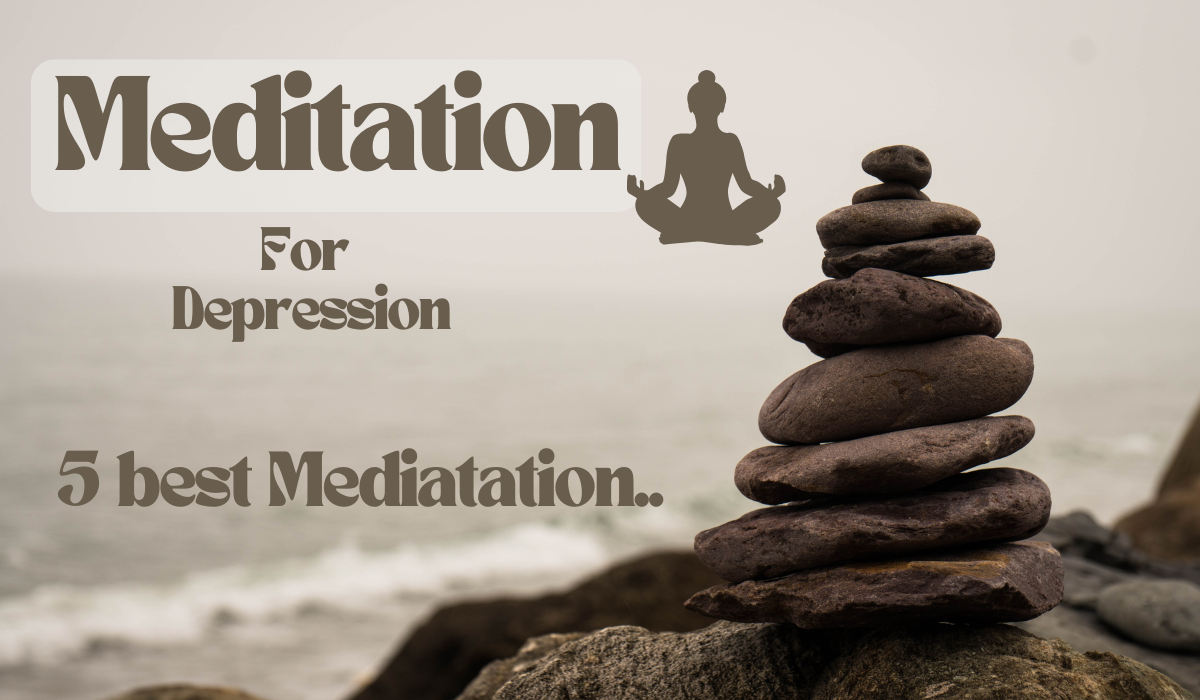Meditation for depression provides a gentle but powerful way to restore mental clarity, emotional balance and inner peace. Depression clouds the mind, making it difficult to focus or feel optimistic. Whether you are struggling with daily stress or deep depression, meditation encourages a sense of calm and stability, making it easier to manage difficult emotions and create a healthier, more peaceful state of mind.

Table of Contents
Meditation For Depression : How meditation helps with depression:
1. Reduces negative thoughts: Meditation reduces repeated negative thoughts.
2. Calming the nervous system: Meditation activates the parasympathetic nervous system, reducing stress and anxiety.
3. Controlling emotions: Meditation strengthens the emotional control areas of the brain and helps control emotions more efficiently.
4. Improve Attention: Meditation increases awareness of the present moment, reducing feelings of helplessness
The best methods of meditation for depression:
1. Mindfulness Meditation:

Just feeling the present moment without any thoughts or judgments
• How to practice:
1. Sit comfortably in a quiet place.
2. Close your eyes and take slow, deep breaths. Pay attention to your breathing.
Benefits: Free you from the bondage of negative thoughts
2.Love-Compassion Meditation (Metta):
Focuses on creating an attitude of love and kindness towards oneself and others . This type of meditation practice leads to less depression, a more positive outlook, fewer negative emotions and more empathy.
How to practice –
1. Sit quietly and close your eyes.
2. Repeat phrases e.g.
-“May I be happy”
-“May I heal”
-“May I be free from suffering”
Benefits: Reduces self-criticism and increases positive emotions
3. Body Scan Meditation:

This method helps people to become more aware of their physical feelings and emotions . This practice helps individuals connect with their physical and emotional sensations, cultivating mindfulness and relaxation.
How to practice:
1. Lie down or sit comfortably.
2.Pay attention to each part of your body starting with your toes and moving upwards.
3.Notice sensation, tension or discomfort.
4.Breathe deeply and feel the relaxation spread through your body
Benefits: Relieves stress and calms the mind.
4. Breathing exercises (pranayama):

Simple yet incredibly effective, these techniques can quickly change your state of mind.
How to practice:
– Breathing in the box: inhale 4 times, hold 4 times, exhale 4 times, and pause 4 times.
– Alternate nostril breathing: Close one nostril, inhale deeply, switch nostrils, and exhale.
Benefits: Quickly reduces anxiety and promotes a sense of calm
5.Guided Meditation
Guided meditation involves listening to a narrator who leads you through a meditation session. It’s especially useful for beginners as it provides structure and support. Guided meditations for depression often include visualizations and calming imagery.
How to practice:
- Find a comfortable seated position.
- Use a guided meditation audio or app that focuses on healing from depression.
- Follow the instructions as the guide leads you through breathing exercises and visualizations.
Benefits: Offers support and guidance, reduces feelings of overwhelm, and helps foster relaxation and calmness.
Getting started with Meditation for Depression :
Incorporating these techniques into your daily routine can significantly improve mental health, reduce depressive symptoms, and promote long-lasting inner peace.
1. Start with 5–10 minutes daily and increase gradually.
2. Meditate at the same time daily. 3. Attention increases in a quiet, distraction-free environment.
4. Practice Patience: Meditation is a skill that improves with practice. If your mind wanders, gently refocus.
Meditation as a journey to better Mental Health
Meditation for depression is not an instant solution but a profound journey towards better mental health—a voyage of self-discovery where you learn to observe your thoughts and emotions with calm detachment. While meditation brings comfort and clarity, its benefits are most impactful when integrated with complementary treatments like therapy, medication, or positive lifestyle changes. Incorporating these techniques into your daily routine can significantly improve mental health, reduce depressive symptoms, and promote long-lasting inner peace.
Read more about Fruits for depression


Very Helpful information.
Meditation is very helpful in depression. Thank you for the article.
Nice Information… Very helpful
Effective information .
Meditation seems like a powerful tool for managing depression and stress. I’ve always wondered how consistent one needs to be with these practices to see real results. The idea of focusing on the present moment without judgment feels both simple and challenging at the same time. I’m curious, though, how long does it usually take to notice a shift in emotional balance? The body scan technique sounds particularly interesting—do you think it’s more effective than other forms of meditation? Also, how do you stay motivated to meditate regularly, especially on days when it feels harder to focus? I’d love to hear your thoughts or experiences with these techniques!
Meditation seems like a powerful tool for managing depression and stress. I’ve tried it a few times, but I’m not sure if I’m doing it right—does it really take time to see results? The idea of focusing on the present moment without judgment feels both simple and challenging at the same time. I wonder if there’s a specific type of meditation that works best for severe depression, or if it’s more about personal preference. The part about repeating phrases like “May I be happy” feels a bit awkward to me—does it get easier with practice? Also, how long should each session ideally last to feel the benefits? I’d love to hear from someone who’s experienced significant changes through meditation—what was your journey like?
Meditation truly seems like a powerful tool for managing depression and stress. I’ve always been curious about how it works on a deeper level—does it really rewire the brain, or is it more about creating a temporary sense of calm? The idea of focusing on the present moment without judgment feels liberating, but I wonder if it’s as simple as it sounds for someone deeply depressed. The emphasis on self-love and kindness is beautiful, though—could this be the key to breaking the cycle of negative thoughts? I’d love to hear more about how long it typically takes to see results or if there are specific types of meditation that work best for severe depression. What’s your experience with it?
Meditation for depression seems like a helpful approach for those struggling with mental clarity and emotional balance. I’ve heard about its benefits, but I’m curious how long it typically takes to see noticeable changes. Do you think it works equally well for everyone, or are there specific types of people who benefit more? I like the idea of focusing on the present moment and reducing negative thoughts through techniques like mindfulness. However, I wonder if it’s challenging to stay consistent with these practices, especially during tough times. Have you personally tried any of these methods? I’d love to hear about your experience and whether it made a significant difference for you. What’s your take on incorporating meditation into daily routines for long-term mental health?
Meditation seems like a powerful tool for managing depression and stress. I’ve always wondered how consistent one needs to be with these practices to see real results. The idea of focusing on the present moment without judgment feels both simple and challenging at the same time. I’m curious, though, how long does it usually take to notice a shift in emotional balance? The body scan technique sounds particularly interesting—has anyone tried it and felt immediate relief? Also, do you think these methods work equally well for everyone, or does it depend on the individual? I’d love to hear more about personal experiences with these techniques!